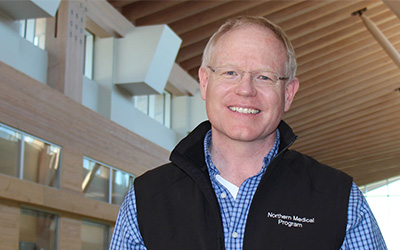
Russ Callaghan
New research from Northern Medical Program Professor Russ Callaghan has found that use of marijuana is associated with the development of testicular cancer.
As part of a retrospective study, Dr. Callaghan and his team looked at data from young men conscripted for military service in Sweden in 1969 and 1970, and tracked their health conditions over the following 42 years. They found that heavy cannabis use (defined as more than 50 times in a lifetime, as measured at conscription) was associated with a 2.5-fold increased risk of developing testicular cancer.
“At this time, surprisingly little is known about the impacts of cannabis on the development of cancer in humans,” said Dr. Callaghan, the study’s lead author. “With Canada and other countries currently experimenting with the decriminalization or legalization of recreational cannabis use, it is critically important to understand the potential harms of this type of substance use.”
The results from the recent study, as well as three prior case-control studies in this area, suggest that cannabis use may facilitate later onset of testicular cancer.
“Our study is the first longitudinal study showing that cannabis use, as measured in late adolescence, is significantly associated with the subsequent development of testicular cancer. My hope is that these findings will help medical professionals, public health officials and cannabis users to more accurately assess the possible risks and benefits of cannabis use.”
The project included an international team of researchers from Karolinska University in Sweden and the Division of Cancer Epidemiology and Genetics at the National Cancer Institute in the U.S. The study is part of Dr. Callaghan’s ongoing research assessing the potential health risks associated with cannabis use and the potential impacts of cannabis legalization on use and related harms.